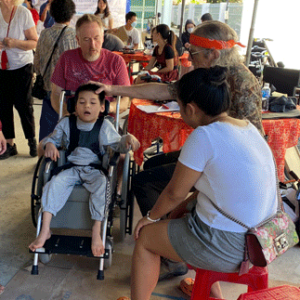
April is Occupational Therapy Month, and we’d like to take this opportunity to thank our Occupational Therapists for the work they do to help our patients and community members, as well as serving communities across the globe.
Occupational therapists help patients develop the everyday skills they need to live and take care of themselves. Illness and injury can leave people needing to re-learn skills to live independent, productive and satisfying lives. This can mean anything from muscle strength and coordination training, to learning how to move safely in their environment and the use of adaptive equipment. Rehabilitation is often personalized to each patient depending on their unique needs.
The drive and desire to help others has long been a motivating factor in the life of Jim Hermeling, Occupational Therapist at Custer Hospital. Jim started his career more than 30 years ago after he suffered a skiing accident, “It was 1989 and I broke my neck while downhill skiing. I had to go through rehab and relearn a lot of things, but I discovered a whole new purpose,” he remembered, “I paid close attention to what my therapists were doing, all the work they were putting in to helping me and it was really inspiring.” Just seven years later Jim was licensed. He says his journey gave him a different perspective when helping his own patients, “When you’ve had a serious illness or injury, things you take for granted every day become so much harder. Things as small as taking a shower or fixing a meal can become major battles. After my own recovery, I wanted to help other people get back to something resembling normal.”
It was a contact from one of Jim’s first jobs as an Occupational Therapist that would eventually lead him to putting his skills to work in another country. “The director of the nursing home where I started my career kept in touch with me over the years, and she let me know about this organization that organized trips to different parts of the world that had different health care needs,” Jim said, “They had a trip planned to Vietnam, and they covered the cost of the flight. All I had to worry about were personal expenses, like food and hotels. It made going a possibility so I decided to go.”
 That organization is Hope Haven International, a ministry that focuses on providing support to people with disabilities. One of their programs works to provide wheelchairs to people around the world. Jim’s expertise was a perfect match for the job of fitting the wheelchair to the person who needed it. “There is a lot to consider when fitting someone with a wheelchair,” Jim said. “You have to consider hip size, the positioning of the footrest and how much spasticity or involuntary movement they have.” This was especially important for the people he was helping because many of them would be in wheelchairs every day.
That organization is Hope Haven International, a ministry that focuses on providing support to people with disabilities. One of their programs works to provide wheelchairs to people around the world. Jim’s expertise was a perfect match for the job of fitting the wheelchair to the person who needed it. “There is a lot to consider when fitting someone with a wheelchair,” Jim said. “You have to consider hip size, the positioning of the footrest and how much spasticity or involuntary movement they have.” This was especially important for the people he was helping because many of them would be in wheelchairs every day.
Jim partnered with another individual who worked in assistive technologies. He said they combined their skills to take on some of the more challenging cases. Jim explained,, “Getting someone fitted into a wheelchair requires getting them sitting up straight and giving them the ability to really see and interact in their environment better,” he continued, “There was one gentleman who had been crawling around the streets of Ho Chi Minh City up to that point. When he got fitted for his chair and was able to really move around, his face lit up with the biggest smile.”
Smiles were not uncommon. For the people who received these wheelchairs, Jim’s work made a major impact in their lives. “I remember one lady in particular. I could see the bald spot on the back of her head from being bed-ridden for so long. When she wanted to spend time with her family, they would basically have to carry her from place to place,” he continued. “Getting this wheelchair gave her independence and the ability to really be with her loved ones again.” Reflecting on his trip he felt like he could do more. “We had a three-day clinic where we really helped people. The rest of the time, our escorts showed us around places like Saigon and Hanoi. It was all really cool and interesting; I had never been there before, but I would have gladly just worked on wheelchairs the whole time.”